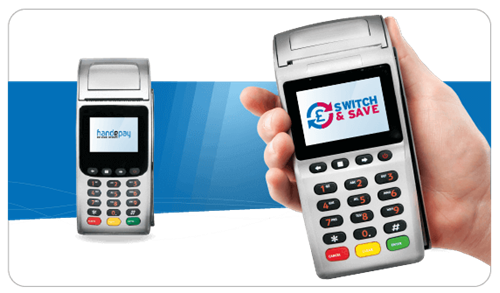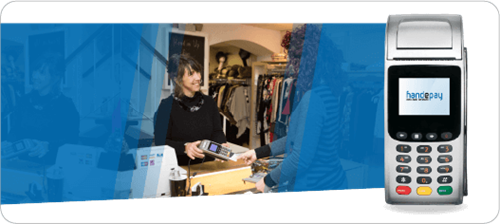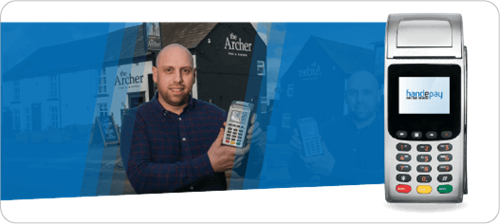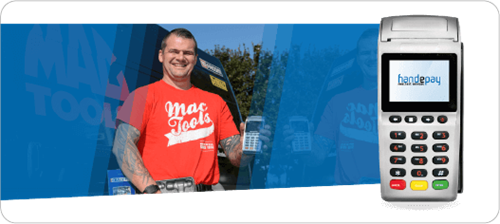Card machine cost options explained
Whether you’re an established business or a fledgling start-up, ensuring you have an easy and convenient way for customers to buy from you is key; particularly when you consider that 16 billion debit and credit card payments were made in 2017 (according to UK Finance).
Read on to discover more about the different card payment options available and, most importantly, how much they cost.

How can I get a credit card machine?
First, you need to set up a merchant account. This will allow you to use a card payment machine and process payments.
Merchant accounts are a type of bank account that can receive money from credit or debit card payments. They’re different to normal business bank accounts and you don’t need to set up your merchant account with the same bank that your business account is with.
Countertop
Just as the name suggests, countertop card machines sit at your point of sale or counter. They allow you to take traditional face-to-face payments at your premises and don’t take up much space. They’re great if you have one fixed location that you want to take all your card payments from.
Business types that could benefit from countertop card machines include shops, dentists, hairdressers and supermarkets.

Portable
Great for taking payments efficiently, portable card machines can be carried directly to your customer, instead of them going to a till. You don’t need to keep them plugged in and, as long as you keep your machine in range, you can move it around and take payments anywhere on your premises.
Portable card machines are particularly useful for restaurants, car servicing/sales businesses, florists and hotels.

Mobile
Do you do business on the go? Mobile card machines can be taken on the road and used to take payments wherever you are. This means you don’t have to worry about your customers having cash or whether or not you have enough change.
For this reason, mobile card machines are popular with a wide variety of professions – from delivery services and tradespeople, to photographers and driving instructors.


How much does a card payment machine cost to rent?
How much you’ll pay to rent a card payment machine will depend on the number of transactions you need to process, the type of machine you’re renting and your business’s turnover.
Businesses that take higher value or a higher volume of transactions can often negotiate lower transaction fees. On the other hand, businesses that take fewer payments are more likely to pay higher transaction fees.
Keep an eye out for potential hidden fees or restrictions too, as these can affect how much you’ll pay. Don’t forget to factor in any upfront and monthly or contract costs, as well as transaction fees.
Renting a card machine
This is the more common option in the UK, but would renting a card payment machine work for your business? This depends on whether side-stepping a larger upfront cost in return for a monthly fee will be better for you in the long run. Here are the pros and cons:
![]()
- Simple set-up with no need to speak to multiple providers - you can arrange it straight away
- You don’t need to pay an upfront purchase cost, which can be particularly helpful if you’re a start-up - as there are more options available to rent a machine, you’ve got more room to negotiate on price
- You’ll have access to the device’s support team
Buying a card machine
If you choose to purchase a PAYG device you may have to buy the machine upfront. Although the cost may seem affordable, you will inevitably pay higher transaction fees. If you choose to buy a standard card machine outright, you’ll pay a larger initial investment, but it could be beneficial in the long term. Here’s a breakdown of the pros and cons:
![]()
- Only requires a one-off payment (as opposed to several monthly payments)
- Less ongoing/long-term commitment
- You own the device outright
![]()
- You won’t own the device
- You’ll probably need to commit to a rental contract, which could tie you in for a long period of time
- You may end up paying more for the device overall – depending on how long you keep it – than you would if you’d paid for it outright
![]()
- You’ll need to pay an initial cost upfront
- If something goes wrong with the device, you’ll need to pay to have it fixed or replaced once the machine’s warranty expires
- Your device may become out of date as technology improves
- You’ll still need to find a provider offering ‘acquiring only’ services - and this is not a common thing within the industry
- Some ‘acquiring only’ options only work with certain terminals.
- An ‘acquiring only’ provider is still likely to tie you in to a contract for processing
- If you purchase a PAYG device, you’ll more than likely pay higher transaction fees
How much does it cost to get a merchant account?
As we’ve already mentioned, you’ll need a merchant account to get a card payment machine. Without getting too technical, merchant accounts validate that your customers have the funds needed in their account to make the payment to you. Whichever provider you choose, each merchant account comes with associated costs.
Upfront costs and monthly fees
Although card processing fees and other costs will vary, below is a guide to the typical rates you can expect to pay and when. It’s worth keeping in mind the difference between flat fees, which will remain consistent, and variable fees, which will fluctuate depending on the value of your transactions.
| FEE type | Typical rate | Does this cost apply to purchased or rented card machines |
When will I pay it? |
|---|---|---|---|
| Debit card transaction fee | 0.3% - 1% | Both | Per transaction |
| Credit card transaction fee | 1% - 2% | Both | Per transaction |
| Gateway or virtual terminal fees | £10 - £20 | Rented only | Per month |
| Card machine rental | £15 - £30 | Rented only | Per month |
| Card machine purchase | £30 - £300 | Purchased only | Once |
It can be difficult to compare card payment machine providers, because each merchant’s pricing works differently. Before you commit to a service, make sure you check exactly what they charge for and how much you’ll pay.
In addition to the costs above, some merchants will require you to pay the following:
- Joining fees
- Installation fees
- Authorisation fees
- Fees for PCI DSS compliance
- Fees for card not present (CNP) transactions
- Cancellation or exit fees (if you choose to end your contract early)
- Minimum monthly service fees (if you don’t meet the pre-agreed transaction threshold)
- Statement and reporting charges
- Swapout fees
Want to avoid hidden charges and enjoy hassle-free, secure payments?
Find out how Handepay’s merchant services and card machines can help you and your business.
Would you like
a callback?
FIND OUT MORE
Talk to an advisor today...



